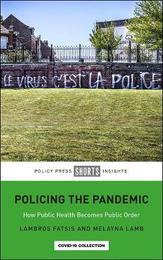
|
Policing the Pandemic: How Public Health Becomes Public Order
Paperback / softback
Main Details
| Title |
Policing the Pandemic: How Public Health Becomes Public Order
|
| Authors and Contributors |
By (author) Lambros Fatsis
|
|
By (author) Melayna Lamb
|
| Physical Properties |
| Format:Paperback / softback | | Pages:148 | | Dimensions(mm): Height 203,Width 127 |
|
| ISBN/Barcode |
9781447361077
|
| Classifications | Dewey:363.2308996 |
|---|
| Audience | | Professional & Vocational | |
|---|
| Illustrations |
No
|
|
Publishing Details |
| Publisher |
Bristol University Press
|
| Imprint |
Policy Press
|
| Publication Date |
7 December 2021 |
| Publication Country |
United Kingdom
|
Description
The COVID-19 pandemic has highlighted the inadequacies of the state's response to public health and public order issues through deeply flawed legislation. Written in the context of the #Blacklivesmatter protests, this book explores why law enforcement responses to a public health emergency are prioritised over welfare provision and what this tells us about the state's criminal justice institutions. Informing scholarly, civic and activist thinking on the political nature of policing, it reveals how increasing police powers disproportionately affects black people and suggests alternative ways of designing public safety beyond a law enforcement context.
Author Biography
Lambros Fatsis is a Senior Lecturer in Criminology at the University of Brighton. His research fuses Cultural Criminology with Black radical thought, focusing on police racism and the criminalisation of Black music subcultures. His co-authored book with Mark Carrigan, The Public and Their Platforms Public Sociology in an Era of Social Media is published by Bristol University Press. Melayna Lamb is a Lecturer at the University of Law, London. Her research interests span the fields and intersections of political philosophy, critical theory and Black radical thought. Her monograph, A Philosophical History of Police Power is forthcoming with Bloomsbury.
Reviews"Succinct, accessible, and informative for students and professionals alike, 'Policing the Pandemic is key for imagining an abolitionist present and future that promotes care, community, and safety disentangled from policing's security and order" Crime Media Culture
|